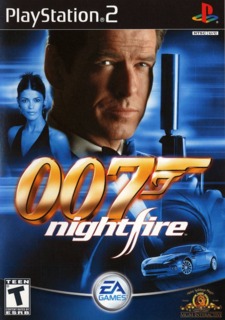Nightfire's creators should've kept the driving segments from the console version and axed the wearisome stealth levels
Nightfire is one of those games that qualifies as a hit due primarily to my all-inclusive love of first-person shooters, but, with a bit of hindsight, actually bored me in spots. I’m referring, of course, to the stealth segments, which are never high on my list of favorite FPS features. The “Night Shift” chapter – in which the only usable item in Bond’s arsenal is the effective but severely limited tranq dart disguised as a fountain pen – was a frustrating exercise in success/failure experimentation, wonky timing, and, to a very large extent, taking advantage of a few loopholes in the enemy AI’s performance. For example, I could remain unnoticed by both guards and cameras by crouching down in the middle of a brightly lit hallway, but standing in that same spot was often a guaranteed bell-ringer that ended the mission immediately; not that I’m complaining, since ducking at the right moment often spared me the unwelcome effort of a do-over. Still, since I played the excellent sneaker Hitman 2 just prior to Nightfire, I found myself wondering why I couldn’t just borrow a sleeping guard’s uniform and have done with the whole knee-walking fiasco.
I’m happy to report that, along with the fountain pen, Nightfire utilizes Q’s treasure chest of miraculous toys masquerading as commonplace objects very often. A keen laser wristwatch comes into play for a number of locked doors and a cell phone doubles as an extremely useful grappling hook. The x-ray mode on Bond’s stylin’ shades was a godsend when it came to timing the movement patterns of those doggone ubiquitous Night Shift guards. I was satisfied with the frequency with which Q’s gadgets were employed; the Santa’s Workshop products in the NOLF series served as more of an alternative to gunfire, so there were entire levels in which I, regrettably, didn’t even need them.
The gun battles in Nightfire are mostly unremarkable, arranged as they are with the standard FPS precepts of “clear room, heal up, sally forth, repeat, repeat, repeat.” When in combat, the game comes across as a ValuSoft bargain title crafted by people with a bit more skill and resources. The lean function doesn’t work properly, but stepping out into the open is a fast path to fatal perforation. Nightfire’s HUD frequently misbehaves by dropping the ammo count and aiming reticle after quickloads. Still, some scenarios were quite memorable: covering Zoe Nightshade’s trek through a fuel depot with a sniper rifle was a hoot, and Bond’s rickety ride on the roof of a collapsing elevator had me bouncing anxiously in my seat.
Much ado was made over the decision to leave out the driving segments of Nightfire when porting the game over to the PC. I didn’t think much of the revisions until I played a little bit of Agent Under Fire on my son’s Xbox. Now I agree with anyone who deems the changes ill-advised, since I really enjoyed the automotive interludes in AUF and don’t quite understand why they were excised from Nightfire. Although I no longer follow Bond’s travails very closely, an encyclopedic familiarity with the film series is far from necessary to understand the mechanics and relationships in Nightfire. The PC version of Nightfire was adequately entertaining as both a shooter and an extension of the 007 universe.

